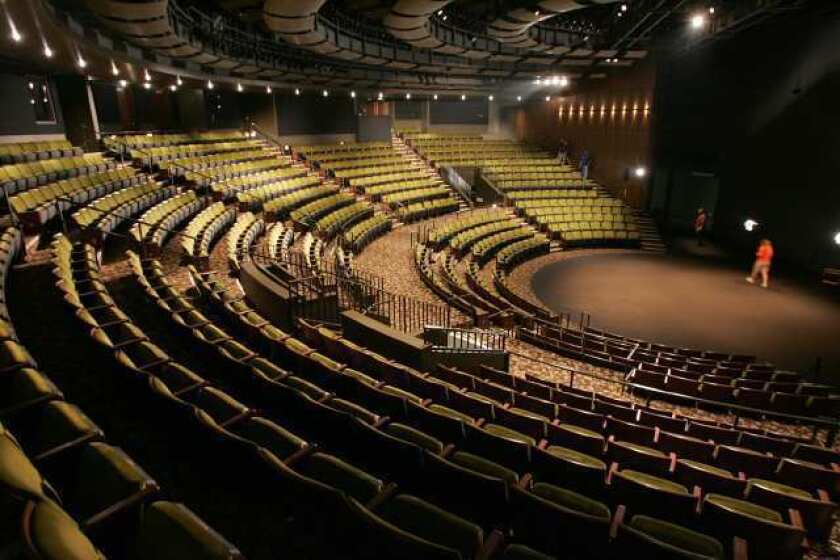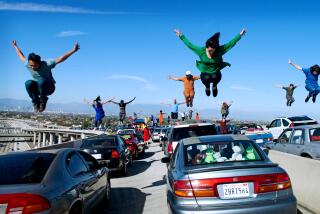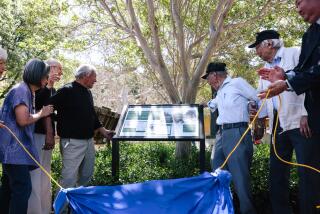Mercutio is tweeting: How L.A.’s Griffith Park Shakespeare festival goes virtual
This summer was to have marked the Independent Shakespeare Co.’s 10th year performing in Griffith Park, but COVID-19 has prompted the annual free Shakespeare festival to move to a smaller venue: your living room.
The company will livestream “Romeo and Juliet” from an indoor stage in Atwater Village for two long weekends starting Thursday. A recorded version of the production will become available for viewing later.
The company said it has been drawing about 43,000 to its Griffith Park stage the last couple of summers. But as the pandemic unfolded in the spring, theaters closed and public health officials banned mass gatherings, Independent Shakespeare Co. considered not putting on any show at all.
“It became clear that nobody was going to be doing anything for a long time. So we had a moment when we really thought that we wouldn’t be doing anything,” said David Melville, ISC’s managing director. “But we felt it important to try and do something that sends a little message and a little beacon of hope that even though things are pretty dire, we’re still here. We’re doing everything we can to stay connected.”
Theater critic Charles McNulty dreams up the ultimate Zoom theater season.
After deciding to move to an online platform, the company wanted to find ways to incorporate the lively atmosphere and interactive elements of the Griffith Park festival. The result is an present-day-set iteration of “Romeo and Juliet” that’s being called a “hybrid production.”
“When we say ‘hybrid,’ we mean that some of the production will actually be live, some of it will be recorded elements. There will be opportunities to interact with the play as an audience member,” said Melissa Chalsma, artistic director of ISC and the director of “Romeo and Juliet.”
These opportunities for interaction will occur largely through social media. Audience members can follow Mercutio on Twitter or Count Paris on Instagram. Both characters will respond in real time to any audience members who respond to their posts. Another interactive element comes in the form of text alerts about the goings-on in Verona.
“In the park, Hamlet might end up on your picnic blanket and take your potato chips,” Chalsma said, describing the festival atmosphere in years past. The goal with the upcoming virtual production is to do something similar, giving audience members a chance to “interact with characters outside the confines of the stage.”
Filmed scenes are a direct response to the need to stay safe while the region still copes with coronavirus. Many scenes are composed of individual shots that actors filmed on their own remotely. Scenes that required multiple people were creatively stage-blocked to keep as much distance as possible. When cast and crew have needed to be on set, they have been tested for coronavirus in advance.
“The staging has been very different, having to adjust the storytelling to be in a camera frame instead of the stage that we’re used to, for the screen rather than for a live audience,” said Nikhil Pai, the actor who not only plays Romeo but also serves as the “unofficial cinematographer.” Pai said the process has been a major learning experience, forcing him to “reimagine the show to what an audience member would see.”
The extra safety measures and the equipment for filming and livestreaming have cost about $20,000, Melville said, but the overall budget is still only $75,000 — significantly lower than the typical ISC summer production cost of $400,000.
The biggest expense for a summer run, typically 13 weeks, is payroll, Chalsma said. Those costs are contained because “Romeo and Juliet” will play for just eight performances, and the crew consists largely of Chalsma and Melville (who also is playing Friar Laurence). All the filming will be done by cast members. ISC won’t lose any ticket revenue because the summer shows are free, but the company will miss the opportunity for concession sales and in-person donations. And moving the production online didn’t save the jobs of the eight people who typically work in lighting, stage managing, building and striking the Griffith Park festival.
“It’s really complicated and I’m having moments where I’ve thought, what in God’s name have we gotten ourselves into,” Chalsma said. “But I think it’s important for us to keep working. We’re grateful to have the opportunity to employ people through this. It’s always important when artists are getting a paycheck for their work.”
“We no longer felt it reasonable or responsible to keep our furloughed staff waiting in limbo any longer,” says the company, which is laying off 91.
Had the pandemic not happened, ISC would have staged “King Lear” and “As You Like It” in Griffith Park. After the decision to proceed with a hybrid production, the company’s initial inclination was to choose “The Comedy of Errors.” But ultimately the play felt too frivolous, Melville said. “Romeo and Juliet” felt like a perfect fit.
“The classic image is someone standing on a balcony and the other person underneath, and the two not being able to connect but really wanting to,” Melville said. “It speaks to the moment.”
'Romeo and Juliet'
When: Livestream performances 7 p.m. Thursdays-Sundays; ends Sept. 27. A recorded performance will be available at a later date
Tickets: Free
Info: iscla.org
More to Read
The biggest entertainment stories
Get our big stories about Hollywood, film, television, music, arts, culture and more right in your inbox as soon as they publish.
You may occasionally receive promotional content from the Los Angeles Times.












